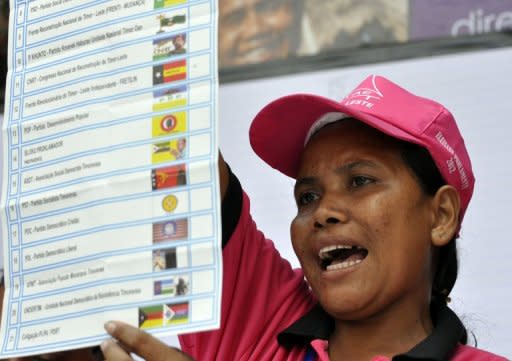E. Timor PM set to stay in power, coalition likely
East Timor resistance hero Xanana Gusmao is set for a new term as premier after his party won most seats in parliamentary polls, but will have to form a coalition, preliminary results showed Sunday. His centre-left National Congress for Timorese Reconstruction (CNRT) was expected to take 31 of the 65 seats in parliament, just two shy of the absolute majority needed to govern alone, the electoral administration said. The results set the stage for negotiations to form a coalition, amid concerns that drawn-out, post-election wrangling could reignite violence in the energy-rich but deeply poor state. The vote is a key test for the fragile democracy, which celebrated a decade of formal independence in May, and is also likely to determine whether the UN will pull out their peacekeepers by the end of the year, as planned. The main opposition left-wing Fretilin party was expected to take 24 seats, Saturnino Babo, spokesman of the Timorese Technical Secretariat for Election Administration (STAE), told AFP. The Democratic Party (PD), a member of the current ruling coalition would take eight seats, while Frente-Mudanca will get two, he said. The tally was based on a provisional count of 100 percent of ballots but a final official result was not expected for several days. PD vice president Lurdes Bessa said talks about forming a coalition with the CNRT had already begun, adding her party was likely to support 66-year-old Gusmao, a hero of East Timor's struggle against Indonesian occupation. "Discussions started just last night, the contact has been initiated but it's going to be very difficult to make a decision," she said, but added that "I think PD will end up supporting Xanana." Commenting on how long negotiations could last, she added "it should happen pretty quickly, probably over the next couple of days". Wrangling over a coalition generated weeks of tensions after the 2007 elections. Gusmao was thrust into the world of politics after his landslide victory in the 2002 presidential election. The United Nations sees the polls -- and their aftermath -- as the last big test that will decide whether its remaining 1,300 peacekeepers and other security staff can withdraw as planned within six months. Its Integrated Mission in East Timor (UNMIT) -- with a total current military, police and civilian force of about 3,000 -- was deployed in 2006 with a mandate to restore security after a political crisis in which dozens were killed and tens of thousands displaced. Presidential polls that were held over two rounds in March and April passed off peacefully, and there has been no major violence linked to the parliamentary polls. In the last legislative elections in 2007, the CNRT won three fewer seats than Fretilin, but Gusmao's party won out in the post-election horse-trading to lead a coalition government with three smaller parties. According to the provisional results from Saturday's vote CNRT had won 36.6 percent of the vote, Fretilin was in second place with 29.8 percent and PD took 10.3 percent. Following the end of Portuguese rule in 1975, East Timor was occupied by Indonesia for 24 years. Some 183,000 people died from fighting, disease and starvation before the half-island state voted for independence in 1999. The country has offshore fields of oil and natural gas and its Petroleum Fund has swelled to $10 billion, but half the 1.1 million people are officially classified as living in poverty. "The biggest risk is poverty," President Tamar Matan Ruak, who has backed the CNRT, said Saturday after casting his vote. He beat Nobel laureate Jose Ramos-Horta in the recent presidential polls. CNRT campaigned on a platform of longer-term investment on major infrastructure projects such as roads, electricity and water. Fretilin, which is synonymous with the pro-independence struggle, pledged to spend oil revenues to lift income and education levels.




